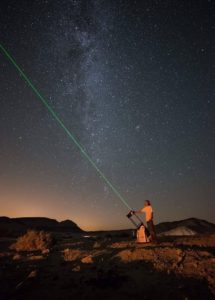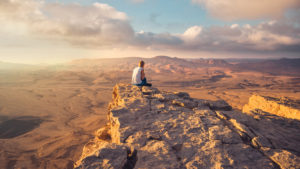With skies still closed, tourism sector homes in on domestic travelers – although Hotel Association head warns it won’t be enough
With inbound tourism off the table for the foreseeable future, Israel’s tourism industry is racing to rebrand itself for travelers of the local variety.
Foreign nationals have been banned from entering Israel since mid-March, while Israelis returning from abroad are required to self-isolate for 14 days in a bid to quell the spread of COVID-19.
As such, domestic tourism is the name of the game for hotels, operators and others working in Israel’s hard-hit tourism sector. One region that has seen promise in this regard is the Negev.
Located in the south, the Negev is a desert region that covers half of Israel’s land area and remains largely unpopulated outside the city of Beersheba. After months of lockdown and with international travel remaining a far-off dream, the area is experiencing a boom in domestic tourism.

A man stargazes in the desert. (Courtesy Deep Desert Israel/Facebook)
Liat Aviely, manager of tourism development in the town of Yeruham, told The Media Line that in recent weeks there had been a surge in Israelis arriving to the region.
“We’re started to see things pick up. For instance, over Shavuot, everything was full here,” Aviely stated, referring to the Jewish holiday that took place over the last weekend of May.
One reason for this is the relatively affordable hotel rates, which tend to be lower in the south than elsewhere in Israel.
Packages at hotels and guesthouses in Yeruham, some of which include full board, range from NIS 540/night (about $156) for a couple on a budget, to NIS 2,600/night for a stay at a high-end guesthouse that also includes a culinary tour, dinner and workshop. Many hotels offer weekend stays that include guided tours, stargazing and cultural encounters with the local Bedouin community.
By contrast, in northern Israel, guesthouses run anywhere from NIS 800 to NIS 3,200 for higher-end places. Many of these overnight stays do not include breakfast and some have two-night minimums. Moreover, several guesthouses in the Galilee have increased prices in recent weeks to make up for lockdown related losses.
Aviely insists that the same is not true of the Negev.
“I know that in the North, they’ve increased the prices, but here we have not raised prices at all,” she stressed. “Israel’s South is more affordable. We believe that this summer will be busier even though it’s usually the Negev’s low season.”
Among the attractions in Yeruham are a large, natural crater with spectacular views, multicolored sand formations and a nighttime excursion that is definitely not for the faint of heart.
“There is a night safari where you go with a guide and special flashlights to uncover scorpions,” Aviely said. “It’s incredible.”

A scorpion is part of a night tour in Yeruham. (Or Alexenberg/Oralex)
She emphasizes that businesses are strictly adhering to the Health Ministry’s coronavirus guidelines, thereby meeting its “purple seal” standard. These include instructions on social distancing and stringent sanitary measures.
Yeruham is not the only locale in southern Israel experiencing a welcome boost in local visitors. The neighboring town of Mitzpe Ramon − with its breathtaking, Mars-like vistas − has long been a draw for both local and international nature-lovers. It overlooks the Ramon Crater, which at 25 miles in length is the world’s largest erosion crater.
“I just finished a phone call with a friend who called to complain that she couldn’t find a place to stay for next weekend,” Yoash Limon, director of tourism for Mitzpe Ramon, told The Media Line.
“We can’t take all the credit. A lot of it has to with the fact that people have been cooped up at home and simply want to get out,” he added.
Mitzpe Ramon recently partnered with the Ramat Hanegev Regional Council and Yeruham under the brand “The Friendly Negev Desert” to change the image of the area.

‘Mars-like vistas.’ A man sits near the Ramon Crater. (Wikimedia Commons/Sharakalaora)
‘Mars-like vistas.’ A man sits near the Ramon Crater. (Wikimedia Commons/Sharakalaora)
To draw Israelis, many operators and hotels are offering shorter packages and flexible options. Mitzpe Ramon has a wide range of activities for visitors to choose from, from guided jeep tours and desert treks to stargazing and wine tours.
“Unfortunately, just like everyone else, we understand that we have to focus our energy right now on domestic tourism, and that’s a conclusion that pretty much everyone in the industry has reached. That’s not unique to Israel,” Limon emphasized.
He adds that firms have to invest in online marketing now more than ever.
“The problem is that businesses in our area are coming out of this crisis with all of their resources depleted, and the very necessary funds that they need for marketing, they don’t have,” he said.
The town is working together with the Mack Ness Fund, which promotes economic development in the Negev, to help businesses boost their marketing budget and increase their online presence, he continued.
Like Aviely, Limon said that the past two weekends had seen very high occupancy (around 80%) in guesthouses and hotels. Nevertheless, places remain empty during weekdays, when Israelis are at work.
Many in the tourism sector are hoping that the much-needed increase in domestic visitors will continue over the coming months. However, this might not be enough to save the industry as a whole.
“I am certain that domestic tourism is very important for our industry, but without international tourism, the industry cannot survive for long,” Amir Hayek, president of the Israel Hotel Association, told The Media Line.
“At the end of the day, Israel is a small country with a small market for tourists, industry and agriculture,” he said. “It will be very hard to maintain the industry long-term. We’re very much waiting for the skies to reopen.”
Last week, Finance Minister Israel Katz and Tourism Minister Asaf Zamir announced an aid package for the tourism and hotel sectors worth NIS 300 million. Most hotels across Israel remain shuttered, and thousands of workers have been furloughed since the beginning of the outbreak.
“Out of all the hotels in the country, 22% have reopened,” Hayek revealed. “The ones that have reopened are located in areas where there is domestic tourism… like Eilat and the Dead Sea.”
While occupancy over the holiday weekend in late May was promising, the rate dropped in the following week, he said. Some Israelis cannot afford to travel due to the economic downturn, and hotels in Israel are notoriously expensive when compared to those abroad.
This might explain why many people are choosing to explore less-traveled corners of the country where the rates are more attractive, Hayek noted.
For hotel owners, the situation is complicated.
“A hotel that reopens with a low occupancy rate loses more money than a closed hotel,” Hayek said. “For this reason, it’s tricky, and hoteliers always have to consider what their occupancy rate will be. A hotel that knows it will lose a lot of money by reopening won’t reopen.”
Hotels that do choose to reopen also have to keep in mind the Health Ministry’s guidelines to ensure the safety of their workers and guests.
“Our biggest dream is for a medical solution for the coronavirus to be found as soon as possible,” Hayek related. “Even after COVID-19, life won’t be the same, and people will be more careful. So in Israeli hotels, we are preparing to do whatever is necessary to guarantee to everyone who comes to us that they will be protected.”